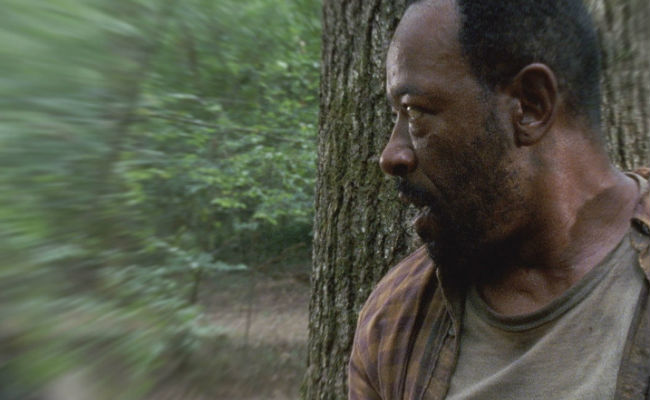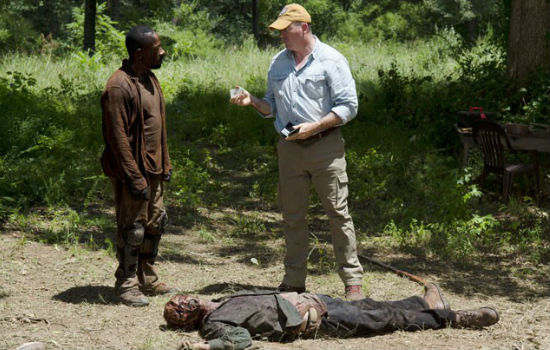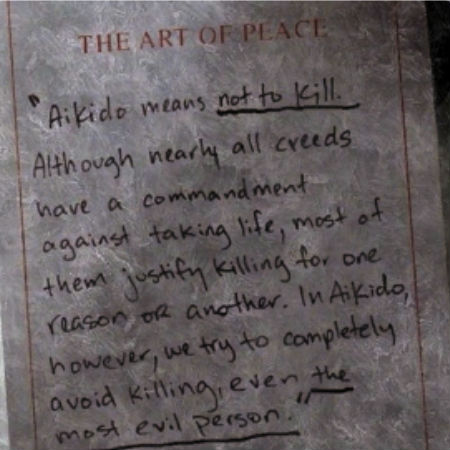
* SPOILERS, AND THE PATH TO SELF-ENLIGHTENMENT LIE AHEAD *
“Here’s Not Here” was a remarkable episode in many ways.
It wasn’t simply that it followed last week’s action-packed, high-adrenaline episode “Thank You” in which – SPOILER! – Glenn died/did not die/got way too close to a dumpster for his own good, and Rick ended up in all kinds of undead peril.
Nor that it’s quiet, relaxed, contemplative pace gave itself over, almost wholly to Morgan’s (Lennie James) backstory which proved to be remarkably compelling television for a whole host of reasons.
Or that it marked a willingness by showrunner Scott Gimple, in a season marked by all kinds of narrative experiments and upending of what has cone before to play with the established order of things still further, a mindset that will stand him in good stead as he seeks to keep The Walking Dead fresh and interesting in the many seasons that undoubtedly lie ahead.
It was all those breathtakingly good things, and then some; but what really made me sit up and pay attention was that it explored something that has been seen to happen many times over in the series but never really named, or for that matter, addressed head on.
That is, the issue of Post Traumatic Stress Disorder (PTSD) which everyone who’s come out the other side of the apocalypse’s initial tumultuous days, and lived long enough to tell the tale, has in spades.
We’ve seen Rick fall apart many times over as he struggles to deal with all the losses, unending grief and betrayal, with the incessant need to stay alert, the burden of leadership, and the weight of so many lives resting on his judgement.
And you could well argue that we have yet to see him put back together again.
The same goes for Sasha (Sonequa Martin-Green), Father Gabriel (Seth Gilliam), Abraham (Michael Cudlitz) … hell everyone really, with no one quite emerging out the other side with any real semblance of healing, just a sense that they needed to keep going and manage the best they can.
Again, and again, the question was asked “Can you ever come back?” and as we watched one apocalyptically-damaged person after struggle to answer the question and fail, we begin to wonder if coming back was even possible.

“Here’s Not Here” – the title alludes to the dissociative sense that we are here but we are not all at once; caught in an ensnaring past that pays no heed to the demands of the present to forge a new way forward, one we simply can’t make, at least not like we need to – gave an answer of sorts to that seemingly eternal question.
In the midst of the paralysing, head-f**king grief and loss that Morgan experienced after losing his wife and son, he found himself on a mission without end – to clear the world of the undead and the dead, to wipe away the mess the world had begun and establish some sense of order.
It was represented beautifully by many of the earlier scenes being rendered in an out-of-focus, almost Doris Day-like Vaseline-on-the-lens blurry lustre, an in-focus Morgan in the centre, unable to see clearly beyond the debilitating fog he’s in.
He’s in the midst of another pogrom of sorts, laying waste to the dead, and two innocent men who wander into his makeshift, zombie-bonfire lit camp – one of whom dies in quite unspectacularly gruesome fashion, the new zen Morgan of the present a long way from emerging when he stumbles upon the home of Eastman (John Carroll Lynch), an Aikido master of sorts, and one time psychiatrist, who has spent the apocalypse (and indeed some of the time leading up to it) alone in the wilderness.
His only company to date has been a goat called Tabitha, part goat cheese initiator, part zombie early warning system, and the memories of a blighted life before the undead came to rule the world, in which a sociopath killed his family and he in turn, killed him, leaving him to starve in a cell in his log cabin for 47 days till he died.
That scarring event, rather series of events led Eastman – yes the name is not particularly subtle, and nor is much of the narrative, but it’s executed with such sensitivity and insight that you can easily ignore that -to hide himself away from the world to such an extent that he only realised the world has ended when he went to hand himself in to the authorities only to find out they, and the world he’d once known, were no longer there.
Retreating to his isolated eerie in the words, he devoted himself to a life in which he vowed to never take a life, a life philosophy that Morgan, crazed with grief and a suicidal need to end it all, or have someone end it for him, couldn’t quite come to grasp.
“It’s about redirecting, evading, and actually caring about the welfare of your opponent. So you have to care about yourself.” You have to believe that your life is precious, that all life is precious. You have to redirect those thoughts, the history that tells you otherwise. What we’ve done, we’ve done. We evade it by moving forward, with a code to never do it again. To make up for it. To still accept what we were. To accept everyone. To protect everyone. And in doing that, protect yourself. To create peace.” (Eastman)

But over the course of 90, beautifully-written, emotionally-affecting minutes, in which Morgan, true to Eastman’s grounded vision – he might have been idealistic but the man was no fool – came to realise the value of peace over war (thanks partly to Morihei Ueshiba’s tome, The Art of Peace) under the gentle but determined tutelage of Eastman who refused to accept that Morgan was too far gone.
Having worked with the worst of the worst in the criminal justice system, many of which he’d successfully worked to rehabilitate, Eastman was convinced that Morgan was not a lost cause, and the way in which his belief in Morgan came to largely, though not completely, influence a very broken man, was compelling.
There were exquisitely transportive moments of peace and beauty as a healing Morgan, who realised life still held some promise and that “Kill me” was not eh solution, and Eastman practised Aikido out against forest and lake.
Sadly the real world intervened in all its ugly ferocity as Tabitha and Morgan both died in quick succession, and Morgan came to appreciate that his new lease on life could really only work in isolation.
Even so, as we saw in “JSS” when the Wolves attacked Alexandria, he has done his level best to stay true to Eastman’s ideals, even as his well-intentioned actions continue to result in all kinds of collateral damage such as the escaped attackers who took on Rick, and soon-to-turn captured Wolf who Morgan has locked in a basement who no doubt will emerge to wreak havoc in due course.
Still, you have to admire his commitment to his newfound mental and emotional sobriety, to his new understanding of the possibilities in life in the apocalypse even if you suspect that his ideals are no real match for the grim realities of a brutally pragmatic undead world.
“Here’s Not Here” was a thing of beauty and poetry, masterfully written by Scott Gimple and directed by Stephen Williams, a clever step away from the full speed ahead madness of the first three episodes, a breather if you like, and a sage and touching, reassuring reminder that even in the middle of horror and loss, life can begin again (even if it isn’t perfectly realised) and you can, in fact, come back.
Are you paying attention Rick?
- Next week could be the week, and it has better be the week please dear god AMC, where Glenn’s true fate is revealed (let’s be honest, it’s pretty obvious but still, hope springs eternal and all that, you know?) in “Now” …